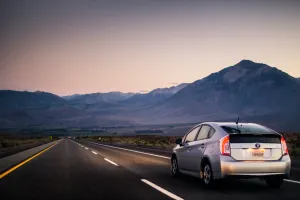On Saturday, Harry and I headed out from the office to get some pizza for lunch. A couple blocks from the office we came upon a small picket outside a Toyota dealership, four or five people at most. I thought it might be yet another strike.
As we passed, we looked behind and saw their signs. It was not a strike but a protest to boycott Toyota. Apparently the manufacturer was opposing electric vehicles (EVs): news to both of us. As we turned back around, I saw a Toyota on the road, coming toward the picket. I joked, observing that it was a Toyota electric hybrid.
On the way back, we noticed that one fellow was wearing a white tee-shirt bearing a slogan scrawled in sharpie, “NO GAS CARS / NO OIL SPILLS!” Little did Harry and I know that might have been Paul Scott, a founder of EV advocacy group Plug In America, who has organized a number of displays like this since late September at that very dealership.
The opposition coming from Scott’s and other pro-EV groups who have signed onto the boycott is centered around Toyota’s lobbying against expanded tax credits for buyers of EVs. According to these groups, this opposition is “putting our nation’s and the world’s transportation and climate future at risk.”
On one hand, sure, lobbying against zero emissions technology is necessarily a negative for the climate, and by extension our own long-term political stability. And electric vehicles are an important part of any decarbonization effort here in car-centric America. But focusing on Toyota and allowing the conventional battery-powered EV as the only permissible form of progress is foolish.
Toyota has been a leading innovator in hydrogen fuel cell and solid state battery technologies, which could prove incredibly important alternatives or complements to conventional EVs.
Regarding solid state batteries, a big trouble with typical EV lithium-ion batteries is their limited lifespan and the limited amount of lithium available on the planet to produce them. The amount of electricity storage we can sustainably achieve via lithium-ion batteries is thus closely tied to the energy density of the battery and its lifespan. Solid state batteries, an innovation which Toyota has largely led, improve on conventional batteries in both these ways.
Regarding hydrogen fuel cells, this technology could sidestep these hurdles completely. This technology—once again led by Toyota with the Mirai—combines Hydrogen gas from a tank in the car with Oxygen pulled out of the air to generate electricity. The only byproduct is water. No lithium is required.
This may seem like a bit of an odd topic, but it points to what I think is a critical concept we need to be taking very seriously today. What adoption we can get of renewable or green technologies now, we need to pursue for the sake of our climate and, as I said, our democracy. To the extent that Toyota has opposed this, they ought to be blamed.
But we must avoid the dogmatic habits of the past if we are to avoid repeating its mistakes. Many of the technologies we expect to rely on—like lithium-ion batteries, electric cars, solar panels—were quite inaccessible until about now. What some thought two decades ago was impossible is now taken for granted, even believed by some to be the only solution, as this boycott demonstrates.
Our future, though, does not depend on this or that green technology. Our future depends on finding novel ways of solving difficult problems. To be limited to only today’s solutions is to be limited by yesterday’s problems, and that’s something we need to remember not just in technology but in public policy. As we face new and intimidating challenges with our climate or our maintenance of democracy, innovation is the future. The old ways have failed.
Subscribe to Spectacles

Comments
Join the conversation